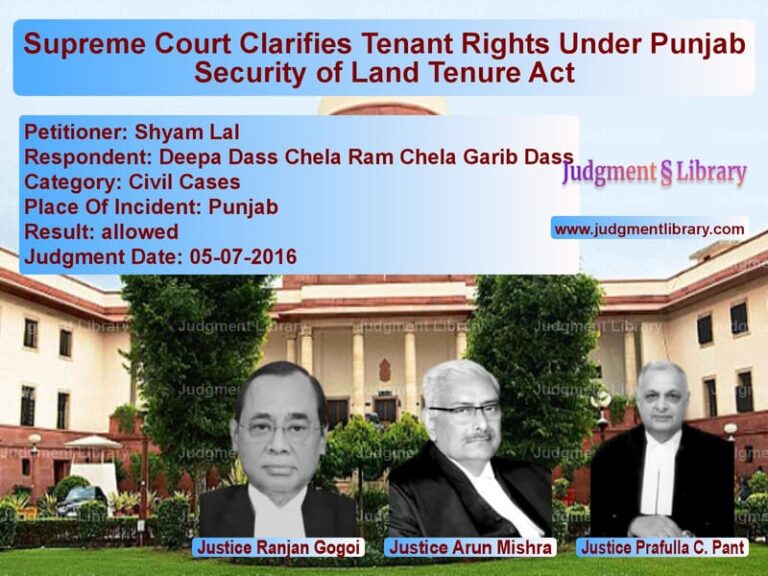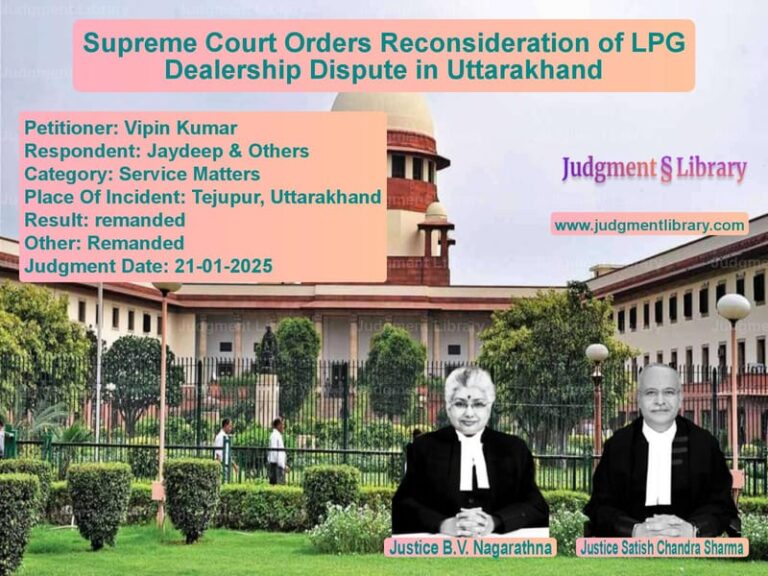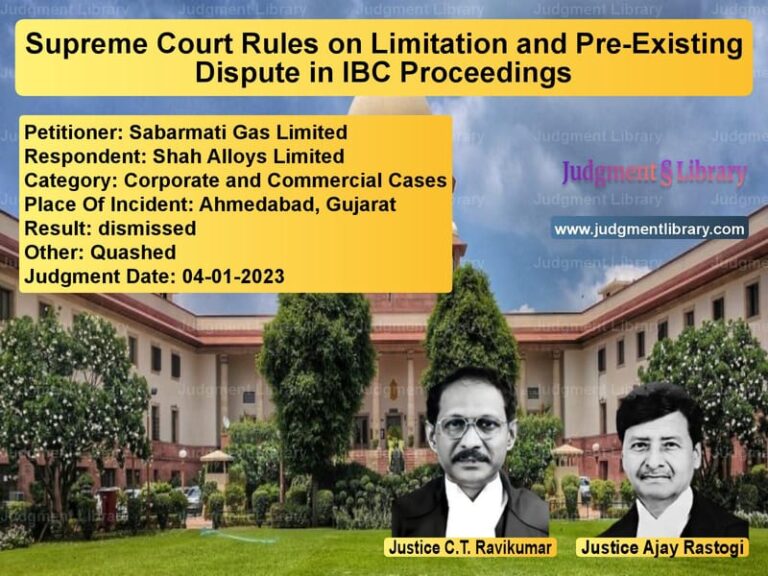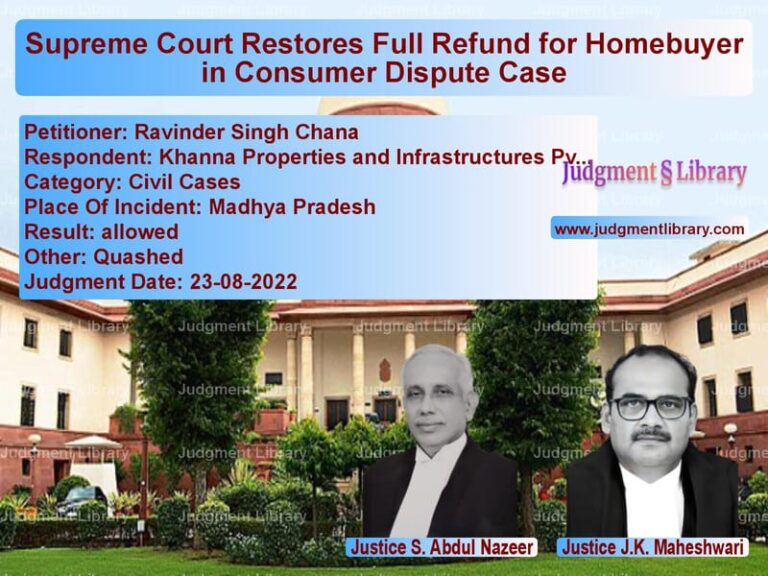Supreme Court Partially Upholds Conviction for Cheating and Sets Aside Abortion Conviction
The case of Prabhu @ Kulandaivelu v. The State of Tamil Nadu revolves around allegations of cheating and causing an unlawful abortion. The appellant, Prabhu, was convicted by the Trial Court under Sections 376 (rape), 417 (cheating), 313 (causing miscarriage), and 506(ii) (criminal intimidation) of the Indian Penal Code. However, upon appeal, the High Court acquitted him of the rape charge and upheld the convictions for cheating and causing a miscarriage under Section 313 IPC. The case was then brought before the Supreme Court for a final judgment regarding the veracity of the allegations and the appropriateness of the sentences.
Background of the Case
The complainant, Tamilselvi (PW-1), was a woman who had a relationship with the appellant under the false promise of marriage. The appellant had sexual intercourse with her multiple times in 2003, resulting in her becoming pregnant. Tamilselvi claimed that against her will, the appellant took her to a hospital, Rudhramoorthy Hospital, where he allegedly forced her into an abortion procedure. As a result of these actions, Prabhu was charged with multiple offenses, including rape, cheating, causing miscarriage, and intimidation.
In the Trial Court, Prabhu was convicted on all counts, including imprisonment for ten years for the offense of rape under Section 376 IPC, one year for cheating under Section 417 IPC, and ten years for causing an abortion under Section 313 IPC. A fine of Rs. 500 was also imposed on him for the offense of criminal intimidation under Section 506(ii) IPC. The High Court later acquitted him of the rape charge but upheld the convictions for cheating and causing miscarriage.
Legal Issues Raised in the Appeal
- Whether the appellant’s conviction for cheating under Section 417 IPC should be upheld.
- Whether the conviction for causing miscarriage under Section 313 IPC is valid, given the evidence of consent provided by the complainant during the abortion procedure.
- Whether the High Court erred in its findings regarding the appellant’s conviction for rape under Section 376 IPC.
Arguments by the Appellant
The appellant, Prabhu, contended that:
- He did not commit any criminal offense as alleged by Tamilselvi. The physical relationship was consensual and was based on mutual understanding.
- The allegations of forceful abortion were false, as the abortion was carried out with Tamilselvi’s consent as confirmed by the doctor (PW-8).
- The conviction under Section 313 IPC for causing miscarriage without consent was based on incorrect evidence, as Tamilselvi had consented to the medical procedure.
- The acquittal for the rape charge was justified, and there were no sufficient grounds to convict him for the offense under Section 376 IPC.
Arguments by the Respondent
The respondent, State of Tamil Nadu, argued that:
- The appellant had taken advantage of Tamilselvi’s trust by inducing her to have sexual intercourse with the false promise of marriage. This amounted to cheating under Section 417 IPC.
- The complainant’s consent for the abortion was obtained under duress, and the appellant’s actions were tantamount to causing a miscarriage without consent, thus violating Section 313 IPC.
- The appellant’s behavior showed that he had intentionally and fraudulently induced Tamilselvi to engage in sexual activity, thereby exploiting her. He was guilty of rape under Section 376 IPC.
Supreme Court’s Observations
The Supreme Court examined the evidence, particularly the testimony of the complainant (PW-1) and the doctor (PW-8), and made the following observations:
- The Court noted that the elements of Section 417 IPC were met, as the appellant had induced Tamilselvi to have sexual intercourse by falsely promising marriage. This deception amounted to cheating, and the conviction under Section 417 IPC was upheld.
- However, the Court pointed out that the essential ingredient for a conviction under Section 313 IPC—“causing miscarriage without the woman’s consent”—was not satisfied. The medical evidence, particularly the testimony of Dr. Valli (PW-8), indicated that the abortion was performed with Tamilselvi’s consent, which nullified the claim of a forced abortion.
- The Court also remarked that while the appellant’s conduct regarding the false promise of marriage was reprehensible, there was no direct evidence to support the allegations of rape. Therefore, the acquittal for the rape charge under Section 376 IPC was not contested.
The Court emphasized:
“The key factor in Section 313 IPC is that the abortion must be caused without the woman’s consent. Since the complainant consented to the abortion procedure, the appellant cannot be held liable under this section.”
Final Judgment
The Supreme Court ruled:
- The conviction under Section 417 IPC for cheating was upheld. The appellant had deceived the complainant and taken advantage of her trust.
- The conviction under Section 313 IPC for causing miscarriage without consent was set aside. There was insufficient evidence to support the claim of non-consensual abortion.
- The conviction under Section 376 IPC for rape was not revisited, as the acquittal by the High Court was justified based on the available evidence.
- The appeal was allowed in part, and the conviction under Section 313 IPC was set aside, while the conviction under Section 417 IPC was upheld.
The judgment concluded:
“The appellant is guilty under Section 417 IPC, and the conviction for Section 313 IPC is set aside. The appeal is allowed in part.”
Conclusion
This case highlights the nuances of criminal law, particularly concerning charges of rape, cheating, and causing miscarriage. The Supreme Court made it clear that consent is crucial in cases involving alleged non-consensual actions, such as causing a miscarriage, and that consent obtained for medical procedures like abortion invalidates claims under Section 313 IPC. The ruling also reinforces the principle that a false promise of marriage, while serious, does not automatically constitute rape but may lead to convictions for cheating. This judgment provides important clarity on the application of Sections 417 and 313 IPC and the evidentiary standards required for a conviction.
Petitioner Name: Prabhu @ Kulandaivelu.Respondent Name: The State of Tamil Nadu.Judgment By: Justice Banumathi, Justice Indira Banerjee.Place Of Incident: Tamil Nadu.Judgment Date: 18-09-2018.
Don’t miss out on the full details! Download the complete judgment in PDF format below and gain valuable insights instantly!
Download Judgment: Prabhu @ Kulandaivel vs The State of Tamil N Supreme Court of India Judgment Dated 18-09-2018.pdf
Direct Downlaod Judgment: Direct downlaod this Judgment
See all petitions in Fraud and Forgery
See all petitions in Bail and Anticipatory Bail
See all petitions in Custodial Deaths and Police Misconduct
See all petitions in Judgment by R. Banumathi
See all petitions in Judgment by Indira Banerjee
See all petitions in partially allowed
See all petitions in Modified
See all petitions in supreme court of India judgments September 2018
See all petitions in 2018 judgments
See all posts in Criminal Cases Category
See all allowed petitions in Criminal Cases Category
See all Dismissed petitions in Criminal Cases Category
See all partially allowed petitions in Criminal Cases Category







